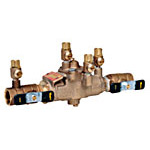To be a qualified and certified backflow tester in Texas, training is needed, including an exam, to be able to gat a state license issued by the Texas Commision of Environmental Quality (T.C.E.Q.).
Backflow Prevention Assemble Tester License (BPAT)
To becone state licensed, a minimum GED or High School Diploma in needed to start a training course. The training course is a 40 hour backflow prevention assemble tester course, including a final exam, offered by a number of training providers.
Providing the education criteria is met, two years of relevent water work experience are also required. This may be via a journeyman plumbing license, public water system operations or lawn irrigation systemsThe backflow licensing course consits of both classroom and hands-on practical training on a variety of backflow preventers and assemblies. Typical assemblies covered include Reduced Pressure Principles, Reduced Pressure Principle Detectors, Double Check Valves, Double Check Detectors, Pressure Vacuum Breakers and Spill-Resistant Pressure Vacuum Breakers.

Students learn testing as well as troubleshooting on different malfunctioning backflow systems, as well as the use of different test guages. Both a written and practicam exam is taken at the end of the course.
The TCEQ BPAT license is valid to 3 years, after which 24 hours of continuing education are required for license renewal.
Backflow Training Class
Once a tester is state licensed, he or she can apply for a local registration to work in a given city. Even within the DFW Tx area, the registration is different,
For the City of Dallas backflow testing, an applicant must produce a current BPAT certificate in addition to a backflow test gauge calibration test report and photo id. See here.
For the City of Ft. Worth backflow testing, the requirements are slightly different. An applicant must produce a current BPAT certificate, a backflow test gauge calibration test report, driver license, proof or insurance, and confined space certificate. In addition, since Fort Worth also requires rain & freeze sensor testing, an applicant must also produce an irrigation license (if he or she wants to do both types of testing). See here.
